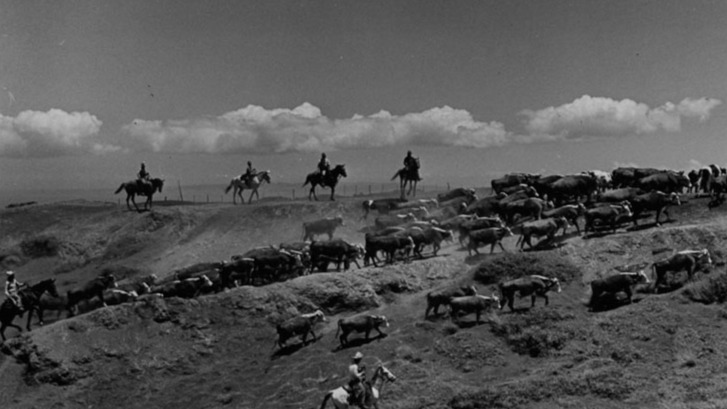
- Home
- Paniolo Hall of Fame
- Inductees
- William "Aka" Arthur Hodgins

Year Inducted: 2024
1941-2021
Molokai Ranch | Molokaʻi
William Aka Hodgins, born on the island of Lānaʻi in 1941, was raised in Honolulu and graduated from Punahou School in 1959. During his high school summers, he worked for his Uncle Sherwood Greenwell at Kealakekua Ranch in Kona where his love affair with the ranch and cowboy life began. During that same time, he was fortunate enough to spend several weeks on a cattle station in Australia, a learning experience he would never forget.
He then attended Montana State College where he majored in Animal Husbandry and Agriculture Production. During that time, he also competed and was quite successful in inter-collegiate rodeo. Upon graduating, Aka served in the United States Coast Guard after which he returned to his beloved Hawaiʻi.
In 1964, he began his 23-year career as Manager of Molokai Ranch, running over 4,000 head of cattle over 30,000 acres with several Molokai paniolo under his direction. During this time, he worked constantly to make the ranch a viable concern, dealing with many stumbling blocks including periods of severe drought in this rather severe landscape. Over the years, he experimented with different breeds in an attempt to determine which were most suitable for this environment. He also worked closely with state officials and veterinarians to help control and prevent bovine tuberculosis which historically has been a problem on Molokai. At one point, Aka was involved with a successful program to include his tested (to be disease free) Molokai beef in a helicopter airlift, salvaging this meat for safe consumption elsewhere.
Working with and sharing ideals and experiences with officials and professionals, other island ranchers, and the Cattlemen's Council were very important to Aka, especially because Molokai was so isolated. Always working to improve the condition of the cattle, he was instrumental in bringing in Tinaroo Glycine, a legume plant feed, known for its high protein content and other nutrients and which was heartily consumed by cattle. Another of his innovations was to bring in Australian Kelpies and Catahoula dogs to help round up cattle out of the thick brush in this often-harsh ranch land.
During his time at Molokai Ranch, he also developed a Wildlife Park as an environmental project covering over 1000 acres suitable for African and Asian game animals that thrived on Molokai Ranch. In another effort to possibly diversify the ranch business, he also established Molokai's kiawe-wood charcoal business and raised Honeybees for the coveted Molokai honey.
Unfortunately, after years of fighting the valiant battle to prevent the re-occurrence of the bovine tuberculosis, which had plagued the island for several decades, the entire cattle population of Molokai was eliminated in 1987 and Aka was forced to leave the ranch. But his love for the island and its people never waned and he remained on Molokai until his death in 2021.